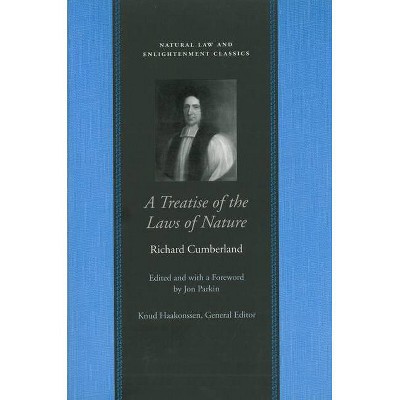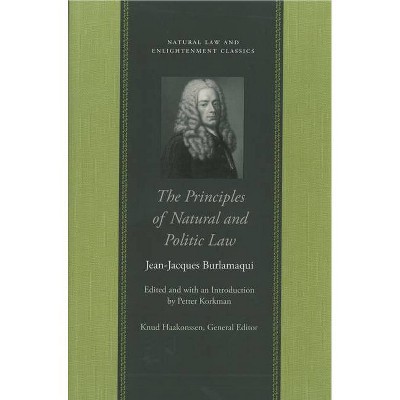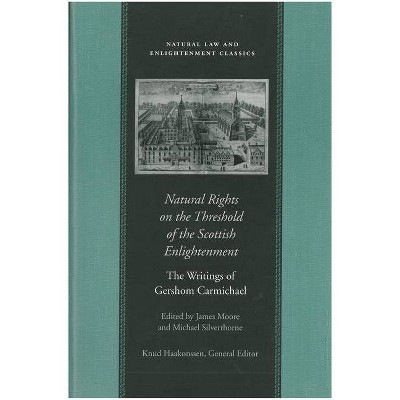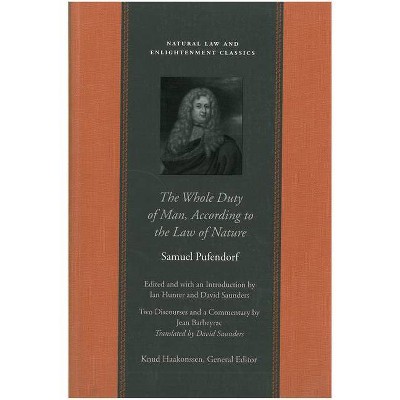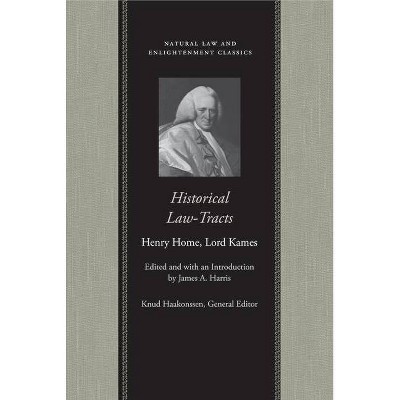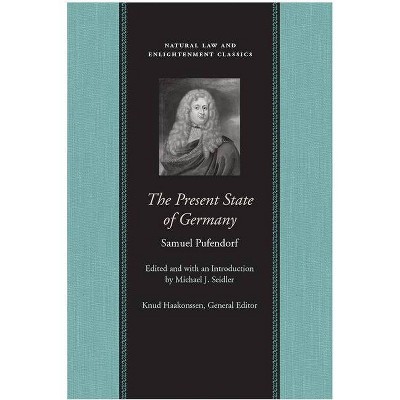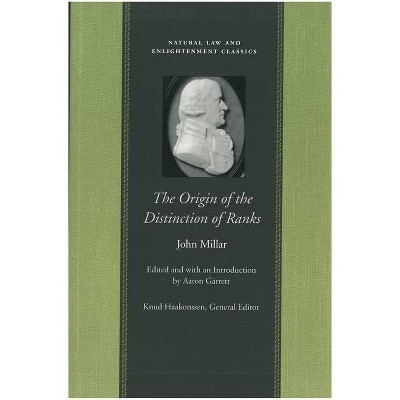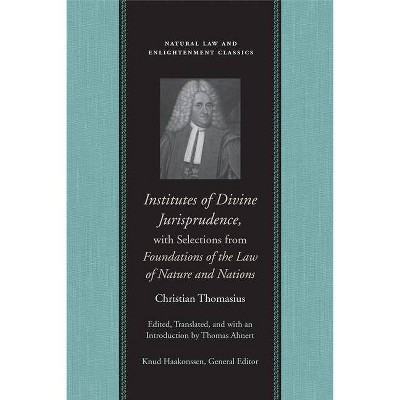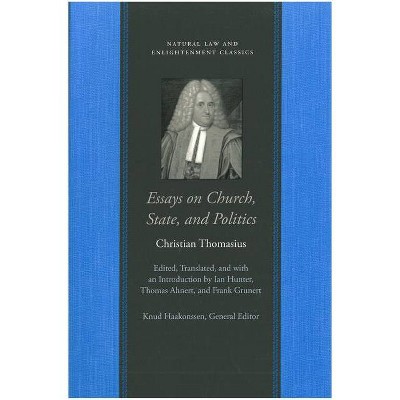A Treatise of the Laws of Nature - (Natural Law and Enlightenment Classics (Paperback)) by Richard Cumberland (Paperback)

Similar Products
Products of same category from the store
AllProduct info
<p/><br></br><p><b> Book Synopsis </b></p></br></br><p><strong><em>A Treatise of the Laws of Nature</em></strong>, originally titled <em>De Legibus Naturae</em>, first appeared in 1672 as a theoretical response to a range of issues that came together during the late 1660s. It conveyed a conviction that science might offer a more effective means of demonstrating both the contents and the obligatory force of the law of nature.</p> <p><strong>Jon Parkin</strong> is a Lecturer in Politics at the University of York, United Kingdom.</p><p/><br></br><p><b> Review Quotes </b></p></br></br><br>Not a misprint, the penny-a-page price reflects Liberty Fund's desire to make accessible natural law and early modern writings, such as this refutation of Hobbes by a future Bishop of Peterborough (1691-1718, replacing a non-juror). Originally published in Latin in 1672, the treatise was translated, prefaced, and subjoined by John Maxwell in 1727, the edition republished here. Among intellectually alert, progressive, Cambridge-educated Anglican clergy, committed to both new scientific discoveries and Christian theology, Cumberland (1632-1718) owed the opportunity for his work to Sir Orlando Bridgeman's patronage and its occasion to disputes over religious toleration. Preceding Locke, influencing Pufendorf, Cumberland argued that a "natural duty of sociability" supplements and supercedes Hobbesian self-preservation, with individual interests best served by pursuit of the common good. To that law of nature, God has attached sanctions and rewards, clues in nature itself to the order he enjoins. Peace and plenty are the reward of cooperation, a state of war the scourge of Hobbesian self-interest. <br /><br />Among the features of this edition, the play between 1672 and 1727, Cumberland's time and Maxwell's, is especially instructive. Mr. Parkin suggests that Maxwell's two introductory essays on heathen errors relative to the deity and morality are intended to shore up revelation, fending off deistic inroads permitted by Cumberland's more generous account of the ancients. Describing pagan views of divinity and the afterlife, from Homer through the Egyptians to the Zoroastrians, with a running attack on Epicurus and a side-swipe at "Heretical-Pagan-Gnosticks," Maxwell provides a fascinating account of the doctrines themselves, the state of comparative knowledge in his time, and the threat to orthodoxy proposed by enthusiasm for alternate systems, including bishops who propose that all moral essentials were known to the ancients. <br /><br />For Maxwell, original sin is more closely allied to sexuality, "concupiscence," than to violence, and he inveighs at length against such nasty pagan practices as prostitutes of both sexes, "genteel. . .Lovers of Boys," the community of women, and Spartan spectacles of naked women. He does, however, correct Cumberland's easy assertion that the husband has power over the wife because of his natural superiority. "Greater Strength of either Body, or Mind, is not universal in Men," he notes, so a woman superior in fortune or sense might stipulate by contract the dominion ordinarily accorded men. <br /><br />"Intelligent design" appears, from Cicero through Cumberland to Shaftesbury, cited at length in the appendix on the law of nature. A popular essay might be written on how a doctrine originally welcoming science turned into an attempt to deny science. Maxwell's other appendix refutes Dodwell's argument that the soul is material before baptism. Marking the new primacy of the body, Cumberland argues about the brain and Maxwell shudders at Stoic principles that discount the body, condemning its sympathy with the mind. Rhetorically, the structure of Maxwell's book is peculiar: his introductory essays revile the ancients' world souls and unified world view, but the subjoined essay on the law of nature deploys pre-Popean praise of such unity from Shaftesbury and others, so that "natural law" ends beautifully, in spite of the neo-Calvinist evil of pagan goodness advanced at the outset. <br /><br />The edition is exemplary. It clearly explains a complex publishing history, identifying important ancillary materials and bibliography, amplifies Maxwell's and Cumberland's citations, including when possible the editions they used. . . .A special treat is the 791-member subscribers list, including twenty women and Dr. Arbuthnot, Berkeley as Dean of Derry, Eustace Budgell of the Middle Temple, Esq., and in large paper, the oft-cited Anthony Collins and Sir Isaac Newton, as well as Ambrose Philips and Thomas Tickell. <br /><br /><b><i>The Scriblerian</i></b><br />Spring 2007 <br /><br /><br />. . . .The present edition includes the notes and comments on Cumberland's text added by his translator in the 1727 edition. Maxwell, no doubt inspired by the way Barbeyrac had translated and annotated Grotius and Pufendorf, followed the example, made supplementary remarks and occassionally registered disagreement with his author. . . .As for the editing, the accuracy of the transcription from the 1727 original, which preserves capitalization, is truly impressive. . . .The editor has done excellent work in supplying additional information, by giving accurate references to works mentioned, and in other ways to assist present-day readers. This also applies to editorial amendments to Maxwell's text. On the whole, the editorial input is most impressive. . . .<br /><br /><b>Thomas Mautner<br />Australian National University</b><br /><br>
Price History
Price Archive shows prices from various stores, lets you see history and find the cheapest. There is no actual sale on the website. For all support, inquiry and suggestion messages communication@pricearchive.us
